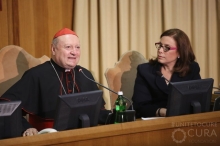Unite to Cure

From April 26 – 28, 2018, the Vatican’s Aula Nuova del Sinodo hosted the 4th edition of the international project highlighting new discoveries and exploring the global needs of the sick. The participants at the event “Unite to cure. A global health care initiative” were received by Pope Francis.
In his speech to the participants the Pope praised the progress of research in seeking out cures for suffering, but also underlined: “Not all that is technically possible, not everything that can be done is for that same reason ethically acceptable.”
During the event the participants - scientists and physicians, patients, families, ethicists and leaders of faith, government, business and philanthropy - engaged in conversations about the needs of patients and the dissemination of knowledge that improves human health, prevents disease, and protects the environment. Among the themes addressed during the work: power of prayer of healing, the importance of a good dietary regime, the epidemic of loneliness, genetic tests and consequence on health
There are diseases which cannot be cured, but all can be cared for. This is why it is important that attention be given to the sick, to the people who are not just a biological problem,” explained Cardinal Gianfranco Ravasi to Vatican News when presenting the international idea planned by the Pontifical Council for Culture and the “STOQ” Science and Faith Foundation, and Cura and Stem for Life.
The event, the fourth of its kind, sought to raise global awareness and create a forum for collaboration around the wide array of powerful and promising cell therapies, gene therapies, and immunotherapies emerging from medical institutions around the world, as well as the impact new technology will have on humanity and society. The 2018 event also examined the role of artificial intelligence, virtual reality and big data in health care delivery, and discussed how technology can be used to extend health care access to less developed nations and to the underserved. Participants also explored ways to prevent disease through behavior modifications, vaccinations, mediation and diet.
"This is one of the most powerful and inspirational global events — it's like Davos, but for health care," said Dr. Robin Smith, President of the Cura Foundation. "We are trying to educate the world and foster hope about the myriad life changing therapies and innovations in development that are driving today's health care revolution. Here in this intimate setting, we seek to break down the barriers and promote multidisciplinary collaboration, as well as encourage support and investment in research and innovation. We want influencers to do their part to grow healthy communities through prevention, education and better access to care. One of the hallmarks of the Vatican event is that we foster open, inclusive discussions about the many ethical, cultural and anthropological implications of emerging technologies, such as gene editing and CRISPR, as well as the transformative impact technology can have on many of the incurable and rare diseases affecting children."
The Conference Goals include:
- Continuing the global Unite to Cure campaign to improve human health and creating a forum for collaboration to advance cures.
- Uniting people without prejudice to stimulate an open dialogue and bring about an interdisciplinary approach to tackle major health care challenges around the globe.
- Increasing awareness, educating the public on scientific advancements and inspiring the next generation.
- Discussing the effect of emerging technologies and their anthropological, ethical, cultural, religious and societal implications.
- Leading the conversation around personalized medicine, regenerative technologies, CRISPR and other innovations, and discussing their impacts on the environment, human health, culture and society.
- Translating complex science into accessible language to catalyze the conversation.
- Reducing the leading causes of cancer in our children, such as smoking, obesity and HPV.
- Increasing the number of registrants in the Be The Match® bone marrow transplantation program, and improve diversity in registrants to enable more individuals in need to find a match.
- Inspiring people to help one another and share their stories of hope.
"The human body holds unique capabilities, which must be understood and harnessed with extraordinary care," said His Eminence Cardinal Ravasi, President of the Pontifical Council for Culture. "We are living in extraordinary times, an era where cures are being developed for many diseases that cause suffering on a global scale. However, as these therapies are being introduced, we must stop and ask the important questions that underlie scientific discovery: 'What will be the societal and culture impact and even the possible anthropologic effects? Where should we draw the line?' This event provides the platform to discuss these questions and more."
"Through this extraordinary event, and our partnership with the Cura Foundation, we seek to articulate a powerful and important perspective on the future of health care and drug development," said Monsignor Tomasz Trafny, Head of the Science and Faith Department at the Pontifical Council for Culture. "We hope to show the world that faith and science can co-exist and, in fact, feed on each other symbiotically, catalyzing hope, cures and as a mutual commitment to decrease human suffering."
For further info: http://vaticanconference2018.com/
Follow us on Twitter @CuraFdn, on facebook.com/TheCuraFoundation and join the conversation with #UnitetoCure.


